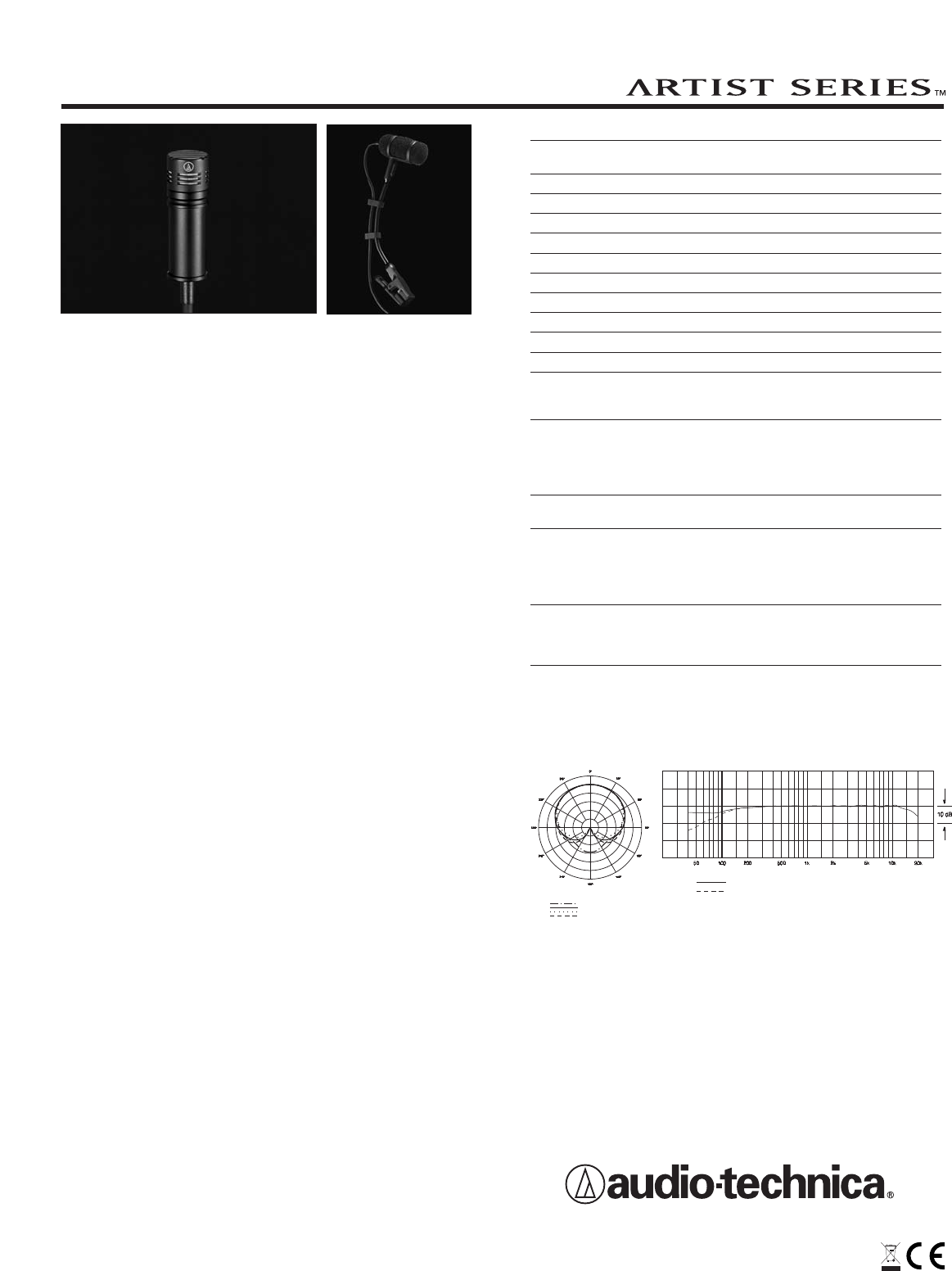
• Low-profile design for minimum visibility
• Attaches to brass, reeds, piano, acoustic bass, snare, toms, and
violin
• UniMount
®
clip permits accurate positioning, provides shock
resistance and protects element
• Unique violin mount permits unobtrusive placement of microphone
between the instrument's bridge and tailpiece
• Crisp, clear, well-balanced response, even at high SPLs
• Cardioid polar pattern reduces pickup of sounds from the sides
and rear, improving isolation of desired sound source
• Interchangeable elements available for hypercardioid and
omnidirectional polar patterns
• Corrosion-resistant contacts from gold-plated XLRM-type
connector
• Rugged, all-metal design and construction for years of trouble-free
use
The ATM350 is intended for use in professional applications where
remote power is available. It requires 11V to 52V DC phantom
power, which may be provided by a mixer or console, or by a
separate, in-line source such as the Audio-Technica AT8801 single-
channel or CP8506 four-channel phantom power supplies.
An integral 80 Hz high-pass filter provides easy switching from a flat
frequency response to a low-end roll-off. The roll-off position reduces
the pickup of low-frequency ambient noise (such as traffic,
air-handling systems, etc.), room reverberation and mechanically
coupled vibrations.
Output from the power module's XLRM-type connector is low
impedance (Lo-Z) balanced. The signal appears across Pins 2 and
3; Pin 1 is ground (shield). Output phase is “Pin 2 hot” – positive
acoustic pressure produces positive voltage at Pin 2.
To avoid phase cancellation and poor sound, all mic cables must be
wired consistently: Pin 1-to-Pin 1, etc.
To use the violin mount, place the microphone in the violin mount's
elastic mic holder. Open the hook & loop fastener; pass the hook
side of the open fastener beneath the strings between the bridge
and the tailpiece. Close the fastener flap around the strings. The
microphone should be on top, with the element facing the bridge
(away from the tailpiece).
Avoid leaving the microphone in the open sun or in areas where
temperatures exceed 110° F (43° C) for extended periods. Extremely
high humidity should also be avoided.
Audio-Technica U.S., Inc., 1221 Commerce Drive, Stow, Ohio 44224
Audio-Technica Limited, Old Lane, Leeds LS11 8AG England
www.audio-technica.com
P51801 ©2006 Audio-Technica U.S., Inc. Printed in China
ATM350
ATM350 SPECIFICATIONS
†
ELEMENT Fixed-charge back plate
permanently polarized condenser
POLAR PATTERN Cardioid
FREQUENCY RESPONSE 40-20,000 Hz
LOW FREQUENCY ROLL-OFF 80 Hz, 12 dB/octave
OPEN CIRCUIT SENSITIVITY –49 dB (3.5 mV) re 1V at 1 Pa*
IMPEDANCE 50 ohms
MAXIMUM INPUT SOUND LEVEL 149 dB SPL, 1 kHz at 1% T.H.D.
DYNAMIC RANGE (typical) 122 dB, 1 kHz at Max SPL
SIGNAL-TO-NOISE RATIO
1
67 dB, 1 kHz at 1 Pa*
PHANTOM POWER REQUIREMENTS 11-52V DC, 3.5 mA typical
SWITCH Flat, roll-off
WEIGHT (less cable and accessories)
MICROPHONE 14.5 g (0.5 oz)
POWER MODULE 81.2 g (2.9 oz)
DIMENSIONS
MICROPHONE
37.8 mm (1.49") long,
12.2 mm (0.48") diameter
POWER MODULE 92.9 mm (3.66") long,
18.9 mm (0.74") diameter
OUTPUT CONNECTOR Integral 3-pin XLRM-type
(power module)
CABLE 4.0 m (13.1') long (permanently
attached to microphone), 3.2 mm
(0.13") diameter, 2-conductor
shielded cable with TA3F-type
connector
ACCESSORIES FURNISHED AT8542 power module; AT8418
UniMount
®
microphone instrument
mount; AT8468 violin mount; soft
protective pouch
†In the interest of standards development, A.T.U.S. offers full details on its test
methods to other industry professionals on request.
*1 Pascal = 10 dynes/cm
2
= 10 microbars = 94 dB SPL
1
Typical, A-weighted, using Audio Precision System One.
Specifications are subject to change without notice.
CARDIOID CONDENSER
CLIP-ON MICROPHONE
8 kHz
Polar Pattern
SCALE IS 5 DECIBELS PER DIVISION
LEGEND
200 Hz
1 kHz
5 kHz
Frequency in Hertz
LEGEND
12" or more on axis
Roll-off
Frequency Response
Response in dB
